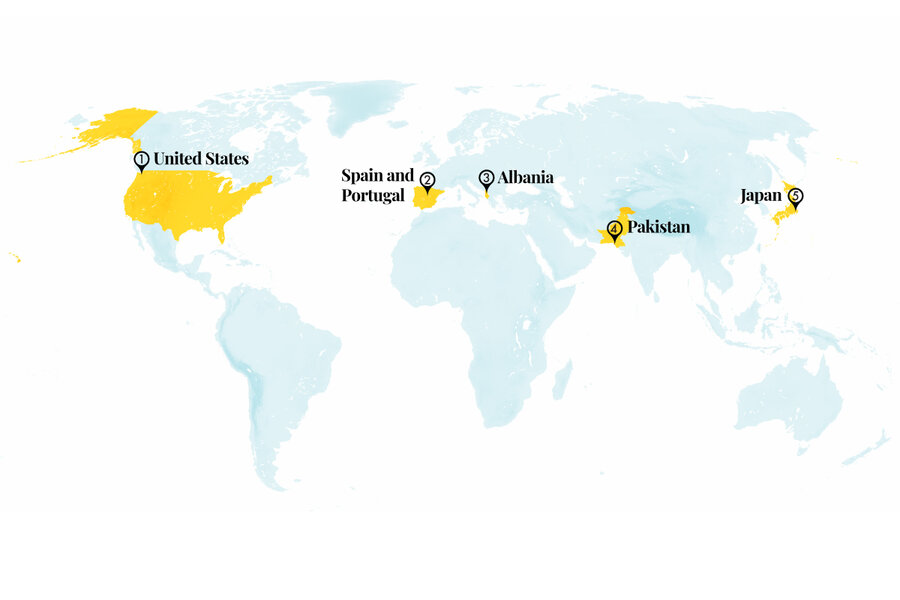Keeping it wild: Tokyo farms and Europe’s last undammed river
Loading...
1. United States
Seattle banned caste discrimination, the first city in the country to do so. While discrimination by caste is illegal in much of South Asia, the systems of hierarchical categorization determined at birth persist there and around the world, often leading to mistreatment of people in “lower” castes.
As South Asian immigrant populations have grown in the United States, so have accusations of caste discrimination in employment, housing, and social life in these communities – along with calls for change.
Why We Wrote This
A story focused onOur progress roundup this week is an appreciation of extremes. Plots of growing food are surrounded by skyscrapers, Albania keeps a river wild, and populations of a lynx unique to Spain and Portugal are rebounding.
In the first formal documentation in the U.S. of caste in the diaspora, a 2016 survey found that one-third of Dalits reported being discriminated against in education, and two-thirds said they were treated unfairly at work. Since Brandeis University added caste to their anti-discrimination policies in 2019, other U.S. colleges have as well, including the California State University system.
Critics of the Seattle law, including Hindu organizations, said it could lead to discrimination against Hindus and dissuade companies from hiring Indians. But Seattle City Council member Kshama Sawant, the council’s only Indian American member and the one who proposed the ordinance, said, “We oppose religion being used as an excuse to abuse others.”
Sources: The Associated Press, The Conversation, Equality Labs, Article14
2. Spain and Portugal
Endangered Iberian lynx populations are rebounding. The wild cat – which was by 2002 reduced to fewer than 200 felines – is making a comeback, with a population of 1,400 now spread across the Iberian Peninsula. From one captive breeding program started in Spain in 2003, 59 lynxes were introduced to Portugal between 2015 and 2022.
Much of Portugal’s forest is privately owned, and activists worked to persuade landowners that a reintroduction of the lynx would have its advantages: Lynxes prey on foxes that threaten livestock, and a tamped-down fox population in turn could help increase depleted populations of rabbits to benefit farmers, hunters, and ecosystems. European rabbits on the peninsula are a keystone species that raptors rely on for food, and small animals use rabbit burrows for nesting.
“If we succeed in lynx conservation, then we’ve succeeded in securing their habitat, which they share with a countless number of other species – including other threatened species,” said Olga Martins, regional director at the Institute for Nature Conservation and Forests. “It’s important to create this community of practice with local communities and landowners and other stakeholders in the region, so that in the long term we can get this to be self-sufficient.”
Sources: Biographic, University of East Anglia
3. Albania
Albania declared the Vjosa River a national park, preserving one of Europe’s last “wild” rivers. Along its 169 miles, from Greece through Albania to the Adriatic Sea, the Vjosa runs through forests, valleys, and canyons, free from artificial barriers. About 119 miles of the river and its tributaries in Albania will now remain so – crucial for the health of some 1,000 species that call the Vjosa home.
Although Albania generates almost all its electricity from hydroelectric power, the park’s protections mean that some 30 planned power stations won’t be built. But the move is consistent with the European Union’s biodiversity strategy for 2030, which includes restoring 25,000 kilometers (15,534 miles) of EU rivers to free-flowing states.
Albania is working with Greece, where the river is called Aoös, to establish a transboundary park and ensure the river’s future protection in both countries.
“Most people in central Europe have never ever seen a wild, living river, free from the impacts of human interference ... where biodiversity is low as a result,” said Ulrich Eichelmann, a conservationist. “Here, you have a wild river, full of complexity.”
Sources: The Guardian, European Commission
4. Pakistan
Karachi is deploying electric buses to cut down on pollution. The first fleet started running in January in Pakistan’s economic capital, where air quality is often poor and traffic is dense. At least 40% of the city’s air pollution comes from vehicles.
On a 2022 index, Pakistan was ranked third worst in the world for air quality, and vehicles on the roads tripled from 2011 to 2020. Analysts say Karachi needs 10 times the number of planned buses, plus widespread adoption of electric vehicles for private use, to significantly reduce air pollution.
Ten buses are currently running, out of an initial fleet of 50, and the government is seeking money from the Asian Development Bank for another 100.
“We want to provide people with emission-free, comfortable and luxury buses along with trained staff to discourage them from using their smoke-emitting cars and motorbikes,” said Abdul Haleem Shaikh, secretary of Sindh province’s transport and mass transit department.
Source: Context
5. Japan
Urban farms continue to feed Japan’s largest city. For hundreds of years, small farm plots have survived amid the capital’s massive growth, providing fresh food to residents and cutting down on food waste that comes from crops that must travel from larger, countryside farms.
A 1992 law allows registered farms in Tokyo to claim tax exemptions in exchange for not selling or developing the land, and it is credited with helping protect many of the city’s farms. Originally set to expire in 2022, a 10-year extension was passed. The number of farms declined 14.5% between 2005 and 2015, but some 1,250 still exist. Government support also includes help with the preservation of traditional crops, farmers markets, and direct marketing.
“Urban agriculture not only provides citizens with fresh, safe, and reliable agricultural products,” said Ryoto Matsuzawa of the Agriculture Affairs Committee of the Tokyo Metropolitan Area. “It also preserves the environment and offers disaster preparedness.”
Source: Reasons to Be Cheerful











